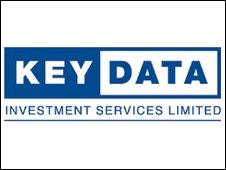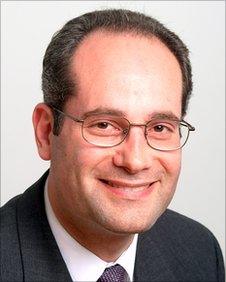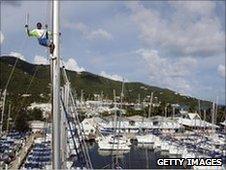Keydata: where did £450m of investors' money go?
- Published

The firm was closed down in June 2009
Nearly 30,000 UK investors are still wondering what exactly has happened to almost £450m they invested in policies sold by the now defunct investment firm Keydata.
It was closed down in June last year by the Financial Services Authority (FSA) for breaking tax rules and because the FSA said it was insolvent.
For several years Keydata, run by Stewart Ford, had been selling policies, offered by two companies in Luxembourg, one called SLS and the other called Lifemark.
The investments were based on packages of second-hand life insurance policies bought from elderly citizens in the USA.
They were designed to provide a steady income and the return of the capital invested and are sometimes called "death bonds".
At first the problem with Keydata seemed to be that it could not pay a tax bill to HM Revenue & Customs (HMRC).
It had wrongly described some of its investment policies as tax-free Individual Savings Accounts (Isas) when, in reality, they did not qualify as Isas, so money was owed to the tax authorities.
However, since Keydata was put into administration last year under the control of the accountancy firm PricewaterhouseCoopers (PwC), there has been a series of revelations about how customers' money was managed.
SLS
SLS in Luxembourg had come under the control of a fugitive and bankrupt called David Elias, who appears to have died in 2009 in Malaysia.

Dan Schwarzmann of PwC hopes for a rescue deal soon
PwC quickly established, last July, that the £103m entrusted to Elias on behalf of 5,500 Keydata investors had disappeared and the UK's Serious Fraud Office (SFO) was called in.
"I was told Keydata, an FSA regulated firm, was providing the products and would invest the money but it was passed to another company [SLS] in an unregulated environment [Luxembourg]," says Peter Magowan, an investor in 2005 who believes he has now lost tens of thousands of pounds.
"I have been told the underlying life assurance policies were sold in 2008, the money was realised by Elias and has gone," he says.
Despite a year long investigation by administrators of Keydata, the SFO, and the Financial Services Authority, most of the SLS savers are still in difficulty.
They have received £42m in compensation by the UK's financial services compensation scheme but still face a huge shortfall of more than £60m.
Lifemark
SLS has now been declared insolvent and is being liquidated, while the other firm Lifemark is in provisional administration in Luxembourg.
The £350m invested by the 23,000 Keydata customers in Lifemark, of which Stewart Ford was also a director, was initially thought to be safe.
However in March, PwC reported that the underlying assets could no longer sustain the promised monthly repayments to the investors and their income stopped.
PwC has also cast some doubt on whether the investors might even get their initial investments back.
"It is clear that the assets are there but it is also clear they are not maturing as quickly as intended and therefore Lifemark has severe cash-flow problems," says the Keydata administrator Dan Schwarzmann.
The problem here is that if Lifemark runs out of cash, and does not keep up the regular premiums of about $4m to $5m a month on the life policies it owns, then those policies will lapse and their value will evaporate.
Commissions
A draft document prepared by the provisional administrator of Lifemark, Eric Collard of the accountancy firm KPMG, suggests that Lifemark has paid £59m of its investors money in commission to other firms.

Tortola, British Virgin Islands, home of LAS Global
Of that, £20m went up front to Keydata for promoting and selling the death bonds.
That was structured as 3% commission to be passed on to independent financial advisers who sold the Keydata policies to their clients, while 2.5% commission was kept by Lifemark itself.
A further £39m - 10% of the funds under management - was paid to a company registered in the British Virgin Islands called LAS Global.
Its fees were for negotiating investment and administration contracts, to provide opportunities to sell the bonds, and to give advice on selling them.
A spokesman for Stewart Ford said: "LAS Global was a company set up by a Ford family trust and was a mechanism to collect fees.
"There was nothing hidden or secretive about this.
"Indeed LAS Global is mentioned in Lifemark's publicly available accounts in the "operating expenses" section and these accounts were signed off by PwC [its then auditors]," he added.
A further £50m of investors money was scheduled to be paid out from the investors' funds as repeat commission between 2006 and 2019.
Were all these huge fees legitimate?
"I have not been asked to launch a forensic examination, to ask what the role was of all the players, and if they were paid for genuine services," said Mr Collard.
What now?
Geoff Hartnell, an independent financial adviser from Finchley in North London who has taken a close interest in the Keydata affair, said he was astonished by the scale of the commissions paid out by Lifemark.
"These fees were never indicated anywhere in the literature presented to investors or intermediaries," he told the BBC.
"In taking this level of commission out, the investors stood little chance of getting their original capital back, together with their targeted income," he said.
Mr Ford's spokesman Jack Irvine said in fact the payments had no bearing on Lifemark's current cash shortage.
"The commission payments were neither here nor there; these were normal for the industry," he told the BBC.
What of the SFO's continuing investigation, which now focuses on Lifemark and Keydata?
"We look forward to discussing this with the SFO as we have absolutely nothing to hide," said Mr Irvine.
A USA hedge fund called CarVal has recently loaned some cash to Lifemark, reportedly about £3.5m, so it can keep paying the premiums on its portfolio of life insurance policies.
A restructuring plan is being devised by Lifemark's provisional administrator and it is hoped this will be published for the approval of the investors in the next few weeks.
But if that comes to nothing there is a possibility that Lifemark will be liquidated, which would threaten the investors with financial disaster.
- Published16 June 2010
- Published21 May 2010